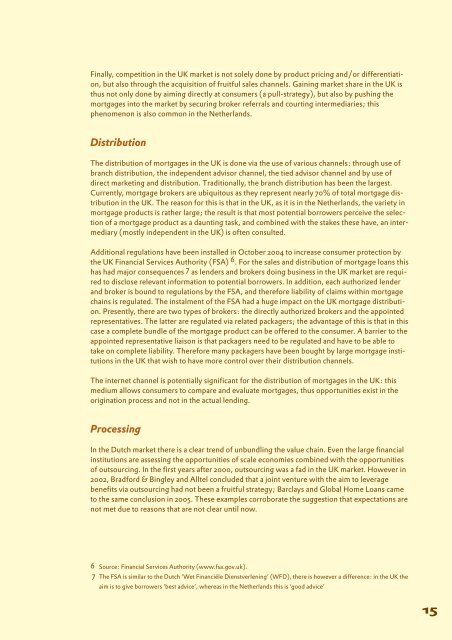European mortgage markets: what can we learn? - Hypsotech ...
European mortgage markets: what can we learn? - Hypsotech ...
European mortgage markets: what can we learn? - Hypsotech ...
Create successful ePaper yourself
Turn your PDF publications into a flip-book with our unique Google optimized e-Paper software.
Finally, competition in the UK market is not solely done by product pricing and/or differentiation,<br />
but also through the acquisition of fruitful sales channels. Gaining market share in the UK is<br />
thus not only done by aiming directly at consumers (a pull-strategy), but also by pushing the<br />
<strong>mortgage</strong>s into the market by securing broker referrals and courting intermediaries; this<br />
phenomenon is also common in the Netherlands.<br />
Distribution<br />
The distribution of <strong>mortgage</strong>s in the UK is done via the use of various channels: through use of<br />
branch distribution, the independent advisor channel, the tied advisor channel and by use of<br />
direct marketing and distribution. Traditionally, the branch distribution has been the largest.<br />
Currently, <strong>mortgage</strong> brokers are ubiquitous as they represent nearly 70% of total <strong>mortgage</strong> distribution<br />
in the UK. The reason for this is that in the UK, as it is in the Netherlands, the variety in<br />
<strong>mortgage</strong> products is rather large; the result is that most potential borro<strong>we</strong>rs perceive the selection<br />
of a <strong>mortgage</strong> product as a daunting task, and combined with the stakes these have, an intermediary<br />
(mostly independent in the UK) is often consulted.<br />
Additional regulations have been installed in October 2004 to increase consumer protection by<br />
the UK Financial Services Authority (FSA) 6 . For the sales and distribution of <strong>mortgage</strong> loans this<br />
has had major consequences 7 as lenders and brokers doing business in the UK market are required<br />
to disclose relevant information to potential borro<strong>we</strong>rs. In addition, each authorized lender<br />
and broker is bound to regulations by the FSA, and therefore liability of claims within <strong>mortgage</strong><br />
chains is regulated. The instalment of the FSA had a huge impact on the UK <strong>mortgage</strong> distribution.<br />
Presently, there are two types of brokers: the directly authorized brokers and the appointed<br />
representatives. The latter are regulated via related packagers; the advantage of this is that in this<br />
case a complete bundle of the <strong>mortgage</strong> product <strong>can</strong> be offered to the consumer. A barrier to the<br />
appointed representative liaison is that packagers need to be regulated and have to be able to<br />
take on complete liability. Therefore many packagers have been bought by large <strong>mortgage</strong> institutions<br />
in the UK that wish to have more control over their distribution channels.<br />
The internet channel is potentially signifi<strong>can</strong>t for the distribution of <strong>mortgage</strong>s in the UK: this<br />
medium allows consumers to compare and evaluate <strong>mortgage</strong>s, thus opportunities exist in the<br />
origination process and not in the actual lending.<br />
Processing<br />
In the Dutch market there is a clear trend of unbundling the value chain. Even the large financial<br />
institutions are assessing the opportunities of scale economies combined with the opportunities<br />
of outsourcing. In the first years after 2000, outsourcing was a fad in the UK market. Ho<strong>we</strong>ver in<br />
2002, Bradford & Bingley and Alltel concluded that a joint venture with the aim to leverage<br />
benefits via outsourcing had not been a fruitful strategy; Barclays and Global Home Loans came<br />
to the same conclusion in 2005. These examples corroborate the suggestion that expectations are<br />
not met due to reasons that are not clear until now.<br />
6 Source: Financial Services Authority (www.fsa.gov.uk).<br />
7 The FSA is similar to the Dutch ‘Wet Financiële Dienstverlening’ (WFD), there is ho<strong>we</strong>ver a difference: in the UK the<br />
aim is to give borro<strong>we</strong>rs ‘best advice’, whereas in the Netherlands this is ‘good advice’<br />
15


